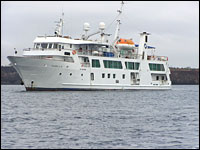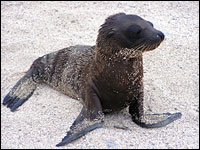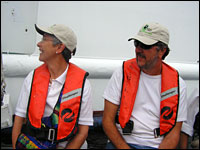
Mary Pearl is the president of Wildlife Trust, cofounder of its Consortium for Conservation Medicine, and an adjunct research scientist at Columbia University. Over the next week, she’ll be traveling in the Galapagos Islands of Ecuador with a boat full of scientists, conservationists, and business leaders to forge partnerships and develop solutions to the global freshwater crisis. This is the first of her dispatches from the journey.

Claudio Padua and I hatched a crazy idea last year, and at this moment we are living with the consequences. Claudio directs research at Brazil’s Institute for Ecological Research (IPE), and I run the organization Wildlife Trust, which is based in New York. Together, we coordinate an entity known as the Wildlife Trust Alliance. The alliance is an egalitarian network of leading research-based conservation organizations around the world. The 14 independent groups each set their own strategies and annual conservation research and action agendas, and come together annually to identify problems we can address as a team, exchange experiences, and make plans for all kinds of collaborations.
After last year’s meeting, Claudio and I decided to bring together members of the Wildlife Trust Alliance and a group of international business leaders to build partnerships between researchers and conservationists and those who can provide advice and support to help them succeed.

But what would be the “carrot”? How do you get the attention of a busy corporate leader? Claudio had an idea: Take them on a fabulous trip with biologists like us. And what could be more fabulous than an Earth Day cruise of the Galapagos Islands of Ecuador? Luckily, Ecuador’s former minister of the environment, Yolanda Kakabadse, is a councilor for the Wildlife Trust Alliance. She thought the idea was good, and agreed to help organize it. She also happened to know a very important global business leader: Ratan Tata, the head of India’s largest conglomerate.
During a visit to New York, Yolanda arranged a breakfast meeting. Though he encouraged the idea, Tata said that CEOs would not want to waste time unless there was some sort of worthwhile seminar during the cruise. He suggested something on freshwater. Claudio also consulted a sympathetic Brazilian business leader, Tribanco CEO Juscelino Martins, who offered more advice on how other groups organize trips that entice businessmen to sign up.
The more we all thought about it, the more we wanted to focus on water. Though climate change may be winning Academy Awards, the No. 1 sustainability challenge on Earth today is freshwater. And there is no water group equivalent to the Intergovernmental Panel on Climate Change, and certainly no meeting of minds of hydrologists, ecologists, and businesspeople who understand how global and local market forces might affect the future of water distribution and use.
So here we are today on the yacht Isabella II, motoring from Baltra to North Seymour Island, ready to get to know one another and begin to grapple with some very different perspectives on water use. The scientists on board include: Dr. Raman Sukumar, head of the Asian Nature Conservation Foundation and the director of the Centre for Ecosystem Studies at the Indian Institute of Science; Dr. Suzana Padua, president of IPE of Brazil; Dr. Rodrigo MedellÃn, founder of the organization Bioconciencia and a professor at UNAM, the national university of Mexico; Dr. Keith H. Nislow, a research fisheries biologist with the U.S. Forest Service; Professor Don Melnick, co-head of the Center for Environment, Economy and Society at Columbia University; and Dr. Upmanu “Manu” Lall, the Alan and Carole Silberstein Professor of Engineering at Columbia University.
On the business side, in addition to Juscelino Martins, we have Guilherme Leal, the founder of Natura, a big international skincare and fragrance company based in Brazil; Oliver Engert, a principal at McKinsey and Company; Peter Solmssen, the executive vice president and general counsel at GE Healthcare, one of the world’s largest medical diagnostics companies; my brother Tony Pearl, who retired as senior vice president and treasurer of McDonald’s Corporation and is now the director of several companies; Beverly Bruce, a coach for high-tech start-ups who spent 24 years with IBM; and Geri Riegger, a financial institution executive who served in government as a White House fellow and an officer at the Federal Reserve.
We also have an assortment of lawyers, foundation executives, and Jan Hamrin, the president of the San Francisco-based Center for Resource Solutions, a nonprofit that focuses on renewable energy and climate change issues.

Yolanda (pictured at right with Claudio) works as a consultant in conflict management of social and environmental issues, so we are prepared to work through very different economic and social perspectives. Each day, we plan to address different aspects of water as the key to sustainability of our world. The first day will be water 101: How much there is, how it is distributed, and the key problems. We will identify problems and then decide what we can do about them. I hope that by the end of our week in the Galapagos, we will have developed enough mutual trust and a sense of common purpose to form a science-business partnership to confront the water crisis.
Go to Mary Pearl’s second dispatch.




